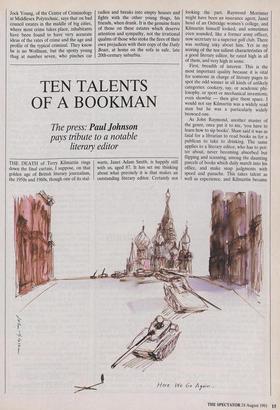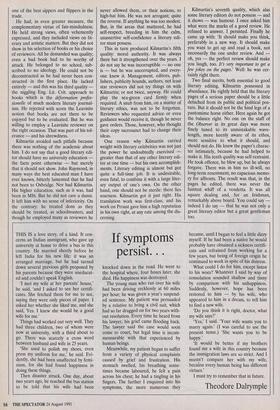TEN TALENTS OF A BOOKMAN
The press: Paul Johnson
pays tribute to a notable literary editor
THE DEATH of Terry Kilmartin rings down the final curtain, I suppose, on that golden age of British literary journalism, the 1950s and 1960s, though one of its stal- warts, Janet Adam Smith, is happily still with us, aged 87. It has set me thinking about what precisely it is that makes an outstanding literary editor. Certainly not looking the part. Raymond Mortimer might have been an insurance agent, Janet head of an Oxbridge women's college, and Kilmartin himself looked, and sometimes even sounded, like a former army officer, now secretary to a superior golf club. There was nothing inky about him. Yet in my scoring of the ten salient characteristics of a good literary editor, he rated high in all of them, and very high in some.
First, breadth of interest. This is the most important quality because it is vital for someone in charge of literary pages to spot the odd winner in all kinds of unlikely categories: cookery, say, or academic phi- losophy, or sport or mechanical inventions, even showbiz — then give them space. I would not say Kilmartin was a widely read man but he was a particularly widely browsed one.
As John Raymond, another master of the genre, once put it to me, 'you have to learn how to sip books'. Shaw said it was as fatal for a librarian to read books as for a publican to take to drinking. The same applies to a literary editor, who has to pot- ter about, never becoming absorbed but flipping and scanning, among the daunting parcels of books which daily march into his office, and make snap judgments with speed and panache. This takes talent as well as experience, and Kilmartin became one of the best sippers and flippers in the trade.
He had, in even greater measure, the complementary virtue of fair-mindedness. He held strong views, often vehemently expressed, and they included views on lit- erary and artistic matters. But they did not show in his selection of books or his choice of reviewers. All he demanded was quality; even a bad book had to be worthy of attack. He belonged to no school, sub- scribed to no ideology. He could not be deconstructed as he had never been con- structed in the first place. He lacked entirely — and this was his third quality the niggling Eng. Lit. Crit. approach to books which is the deformation profes- sionelle of much modern literary journal- ism. He rejected with scorn the Leavisite notion that books are not there to be enjoyed but to be evaluated. But he was willing to employ a Leavisite reviewer on the right occasion. That was part of his tol- erance — and his shrewdness.
Kilmartin avoided such pitfalls because there was nothing of the academic about him. I do not say that a good literary edi- tor should have no university education the facts point otherwise — but merely that it should not show. John Raymond, in many ways the best educated man I have ever known, bitterly lamented that he had not been to Oxbridge. Nor had Kilmartin. His higher education, such as it was, had been in MI6. But he did not care a damn. It left him with no sense of inferiority. On the contrary: he treated dons as they should be treated, as schoolmasters, and though he employed many as reviewers he never allowed them, or their notions, to high-hat him. He was not arrogant; quite the reverse. If anything he was too modest. But, in the areas that mattered, he had self-respect, breeding in him the calm, unassertive self-confidence a literary edi- tor must possess.
This in turn produced Kilmartin's fifth quality: moral authority. It was always there but it strengthened over the years. I do not say he was incorruptible — no one is — but he was uncorrupted, and every- one knew it. Management, editors, pub- lishers, publicity hounds, authors, not least star reviewers did not try things on with Kilmartin; or not twice, anyway. He could play the sea-green card firmly when required. A snub from him, on a matter of literary ethics, was not to be forgotten. Reviewers who requested advice or even guidance would receive it, though he never gave orders. Those, however, who thought their copy sacrosanct had to change their ideas.
One reason why Kilmartin carried weight with literary celebrities was not just the power he undoubtedly exercised greater than that of any other literary edi- tor at one time — but his own accomplish- ments. Literary editing is almost but not quite a full-time job. It is undesirable, even fatal, to combine it with a large liter- ary output of one's own. On the other hand, one should not be sterile: there lies sourness. Kilmartin got it just right. His translation work was first-class, and his work on Proust gave him a high reputation in his own right, at any rate among the dis- cerning. Kilmartin's seventh quality, which alas some literary editors do not possess — and it shows — was humour. I once asked him what were the marks of a good review. He refused to answer. I persisted. Finally he came up with: 'It should make you think, preferably in a new way. It should make you want to get up and read a book, not necessarily the one under review. And oh, yes — the perfect review should make you laugh, too. It's very important to get a few jokes on the pages.' Well: he was cer- tainly right there.
Two final merits, both essential to good literary editing, Kilmartin possessed in abundance. He rightly held that the literary pages of a serious paper should be a little detached from its public and political pos- ture. But it should not be the hind legs of a pantomime horse either. Here again he got the balance right. No one on the staff of the Observer in its great days was more finely tuned to its unmistakable wave- length, more keenly aware of its ethos, more sensitive to what it should, and should not do. He knew the paper's charac- ter intimately, because he had helped to make it. His tenth quality was self-restraint. He took offence, he blew up, but he always forgave. There was in him no no long-term resentment, no capacious memo- ry for affronts. The result was that, in the pages he edited, there was never the faintest whiff of a vendetta. It was all square dealing and, for an Irishman, remarkably above board. You could say indeed I do say — that he was not only a great literary editor but a great gentleman too.



















































 Previous page
Previous page